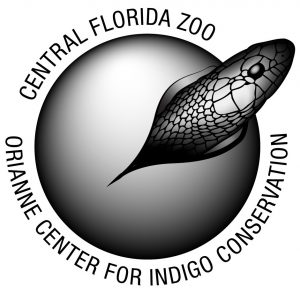

The Orianne Center for Indigo Conservation (OCIC) is operated by the Central Florida Zoo & Botanical Gardens and a captive breeding facility for the striped newt. The OCIC’s mission is to re-establish this threatened species into its former range. Striped newts hatched at the OCIC are reintroduced in regions where historic populations have disappeared. To accomplish this, partnerships with nonprofit organizations and regulatory agencies combine both expertise and resources to reach program goals.
The striped newt (Notophthalmus perstriatus) is a small salamander species with a very restricted global range — it is found only in northern Florida and southern Georgia. These newts belong to a group of pond-breeding amphibian species, that typically use small, isolated wetlands that lack predatory fish. Adult striped newts typically immigrate from surrounding uplands into isolated wetlands during fall and winter rains and emigrate several months later after breeding and oviposition.
Approximately 6 months after hatching, a larva either changes into an eft (immature terrestrial stage) and leaves the pond or remains in the pond and matures into a paedomorph (gilled adult) roughly six months later. Adult striped newts can live 12–15 years.
Threats to the striped newt include fire suppression or exclusion in wetland and upland habitats, prolonged droughts, off-road vehicle impacts at breeding ponds, road mortality, habitat loss and degradation from silviculture, agriculture, and urbanization. Extant populations are estimated to occur in only 9 ponds in Georgia and 106 ponds in Florida.
The striped newt population in the Apalachicola National Forest (ANF) declined to undetectable levels in the early 2000s. This severe decline instigated the coordination of the Coastal Plains Institute with the US Forest Service to create a self-sustaining striped newt population in the ANF. The goal is to bring the striped newt back to an area that once harbored one of the largest populations in the world. Since that time, this project has grown to include many agencies, zoos, and organizations, including the Central Florida Zoo & Botanical Gardens.
After thirteen years, as of February 2025, the grand total number of striped newts released back into its former range has been over 6,750.
The reintroduction efforts for the striped newt are only the beginning of building a healthy sustainable population. With the continuous help and support from our partners, foundations, and donors, the Striped Newt is on its way to becoming a thriving species in the southern U.S. and will continue to play a vital role in our ecosystem.
What Your Donation Can Provide
$25 helps us monitor fertility and reproductive health in our breeding animals so that we can provide the healthiest offspring for release into the wild.
A $50 donation will allow us to increase the number of offspring for release into the wild.
A gift of $100 supports monitoring the growth and health of our juveniles as they are reared for wild release.
Help us monitor Eastern Indigo Snake and Striped Newt survival in the wild with a contribution of $250.
Your gift, in the amount of your choosing, will have an immediate impact on the programs offered at the OCIC to teach conservation and an appreciation of Florida’s natural wildlife, while promoting public education and tolerance of snakes in our communities.